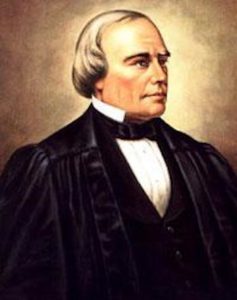
Benjamin Curtis
*On this date, in 1809, Benjamin Curtis was born. He was a white-American attorney and a United States Supreme Court Justice. Curtis was the first and only Whig justice of the Supreme Court. He successfully acted as chief counsel for the Impeachment of U.S. President Andrew Johnson.
Benjamin Robbins Curtis was born in Watertown, Massachusetts, the son of Lois Robbins and Benjamin Curtis, the captain of a merchant's vessel. Young Curtis attended typical school in Newton and, beginning in 1825, Harvard College, where he won an essay writing contest in his junior year. At Harvard, he became a member of the Porcellian Club. He graduated in 1829 and was a member of Phi Beta Kappa. He graduated from Harvard Law School in 1832 and was admitted to the bar later that year.
In 1834, he moved to Boston, where he joined the law firm of Charles P. Curtis. Practicing in that maritime city allowed Curtis to develop expertise in admiralty law and became known for his familiarity with patent law. In 1836, Curtis participated in the Massachusetts "freedom suit" of Commonwealth v. Aves on behalf of the defendant. The decision in this freedom suit engendered controversy and helped to alienate the South. It was in contrast to the Dred Scott decision, in which he participated as an Associate Justice of the Supreme Court. Curtis was married three times and had 12 children. Curtis received a recess appointment to the Supreme Court on September 22, 1851, by President Millard Fillmore, filling the vacancy caused by the death of Levi Woodbury.
Massachusetts Senator Daniel Webster persuaded Fillmore to nominate Curtis to the Supreme Court and was his primary sponsor. Curtis was formally nominated on December 11, 1851, was confirmed on December 20, 1851, and received his commission the same day. He was elected a Fellow of the American Academy of Arts and Sciences in 1854.
He was the first Supreme Court Justice to have earned a law degree from a law school. Curtis was notable as one of the two dissenters in the Dred Scott case, in which he disagreed with every holding of the court. He resigned from the court on September 30, 1857, because he was exasperated with the fraught atmosphere in the court engendered by the case. As one source puts it, "A bitter disagreement and coercion by Roger Taney prompted Benjamin Curtis's departure from the Court in 1857."
After his resignation, Curtis returned to his Boston law practice, becoming a "leading lawyer" in the nation. During the ensuing decade and a half, he argued several cases before the Supreme Court. In 1868, Curtis acted as chief counsel for the Impeachment of U.S. President Andrew Johnson during the impeachment trial. He read the answer to the articles of impeachment, and it was "largely his work." His opening statement lasted two days and was commended for legal prescience and clarity. He successfully persuaded the Senate that impeachment was a judicial act, not a political act, so it required a full hearing of evidence.
This precedent "influenced every subsequent impeachment." After the impeachment trial, Curtis declined U.S. President Johnson's offer of the position of U.S. Attorney General. A highly recommended candidate for the Chief Justice position upon the death of Salmon P. Chase, Curtis did not receive the appointment. He was the unsuccessful Democratic candidate for U.S. senator from Massachusetts in 1874. From his retirement from the bench in 1857 to his death in 1874, his aggregate professional income was about $650,000. Benjamin Curtis died in Newport, Rhode Island, on September 15, 1874. He is buried at Mount Auburn Cemetery, 580 Mount Auburn Street, Cambridge, Massachusetts.